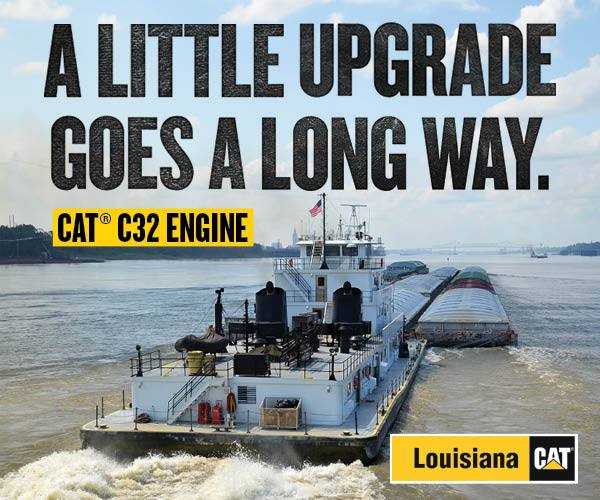$39 Million In Marine Highway Grants Awarded
The U.S. Department of Transportation’s Maritime Administration announced October 6 that it has awarded nearly $39 million in grants to 12 marine highway projects across the nation under the America’s Marine Highway Program (AMHP)—including some important inland waterway projects. Many of the projects build up infrastructure for container-on-barge operations.
- In Arkansas, the West Helena/Phillips County Port Authority was awarded $2,872,414 for Helena Harbor M-55 Container-on-Barge Project. The America’s Marine Highway Grant funds will go toward purchasing equipment to operate the terminal and equip the bridge crane to handle containers. Investments will provide improved access to the terminal and equipment will provide efficient and effective material handling capabilities.
- In Illinois & Missouri, Midcoast Terminal, operated by SCF Lewis and Clark Terminal LLC, was awarded $2,418,500 for the M-55/M-35 Marine Highway Barge Project. The funds will go toward the purchase of four modern, fuel-efficient, and environmentally friendly Hyster forklifts, a Manitowoc Cable Crane to load/unload unitized cargo onto barges, and a barge winch system to load/unload unitized cargo onto barges as well. This equipment will be located at the Port Authority of St. Louis’ Municipal River Terminal, America’s Central Port (Granite City, Ill.), and the Madison Harbor (Madison, Ill.).
- In Louisiana, SEACOR AMH LLC was awarded $1,050,000. The funds will go toward the purchase of 70 chassis that will be used to support the continued growth of the Baton Rouge-New Orleans Shuttle Service. The grant will help increase cargo handling capacity and reduce landside congestion and air emissions.
- In New York, the Port of Oswego Authority received $754,000 for the Oswego Port Great Lakes Container Service Reach Stacker Project. The funds will go toward the purchase of a fully mobile reach stacker for loading and unloading containers, making it versatile for transporting and stacking containers at the port’s facility. The service will utilize a Green Shipping Line’s Jones Act-compliant vessel modified for containerized cargo. This vessel doesn’t have a crane for container loading/unloading, thus making this equipment critical to enable operations.
The other projects that received grants were located in Puerto Rico, Washington, California, Virginia, New York, New Jersey, Guam and Wisconsin. Thanks to this year’s Bipartisan Infrastructure Law, the AMHP received an additional $25 million in funding—the largest single investment in the program ever.
“At a time of record demand for goods, it’s more important than ever to strengthen our supply chains so our manufacturers can grow, and American families can get the things they need quickly and affordably,” said U.S. Transportation Secretary Pete Buttigieg. “Today’s announcement will help improve our marine highway system across the country, alleviating congestion, modernizing port operations, and ultimately lowering the cost of goods for American families.”
“America’s Marine Highway Program is an innovative program that encourages the use of America’s navigable waterways for the movement of freight and people, reducing congestion on land-based transportation,” said Maritime Administrator Ann Phillips. “The funding announced today advances our ongoing efforts to help new marine highway services begin operation and to improve existing services.”
Since its inception, the AMHP has designated 58 Marine Highway Projects bolstering jobs and local economies across the country. In this round of funding, the 12 Marine Highway Grants were awarded to strengthen supply chains and bolster national security by adding to the nation’s strategic sealift resources and providing transportation alternatives during times of disaster or national emergency.
Nearly all the funding will go to projects in historically disadvantaged communities or federally designated community development zones, MarAd said. Preference was also given to projects that demonstrate a movement toward lower carbon emissions or near-zero emissions, that reduce air emissions and vehicle miles traveled, and projects that strengthen America’s supply chains.
All Marine Highway Grants award recipients must apply, comply with, and implement all requirements of the Bipartisan Infrastructure Law’s “Buy America, Build America” provisions. Grant funds can be used to purchase low-emission U.S.-manufactured equipment, such as container reach stackers and cranes, as long as all iron, steel, manufactured products, and construction materials are produced in the United States.
In addition, funds can be used to purchase intermodal equipment—such as U.S.-manufactured container chassis—that can alleviate supply chain bottlenecks.



